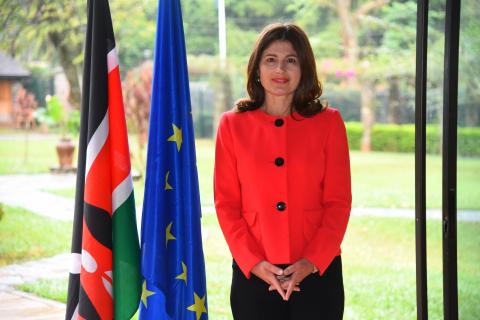EU Ambassador to Kenya Henriette Geiger
NAIROBI, Feb 5 (NNN-GNA) — The European Union has threatened to blacklist Kenya over corruption and money laundering, revisiting an old problem Nairobi has struggled to contain.
EU Ambassador to Kenya Henriette Geiger said Kenya’s reluctance to curb corruption and money laundering could scare off investors. She told a media briefing over the upcoming European Union-Kenya Business Forum with the Kenya Private Sector Alliance that Nairobi may also face restrictions.
“For us, we think that to fight corruption is in the best interest of Kenya because maybe this is the single most determinant of investment. And also, Kenya is on the watchlist for money laundering,” said Geiger.
“If Kenya is not making an effort, it will be blacklisted and that has a lot of very negative consequences. The most important one is that investors are shying away.”
Geiger was reacting to the recent corruption ranking index by Transparency International.
Kenya was last week ranked 123 least corrupt nations out of 180 countries, according to the 2022 Corruption Perceptions Index reported by Transparency International.
The global civil society organisation leading the fight against corruption ranked Kenya at 123 out of 180 countries and territories assessed with a score of 32 out of 100, a slight improvement from a score of 30 points in 2021.
In the just-released findings on Tuesday, Kenya’s score of 32 points matched the sub-Saharan average score of 32 but fell below the global average score of 43.
According to Transparency International, a score below 50 indicates serious levels of public sector corruption.
A 2022 report submitted to the US Congress, also ranked Kenya among the world’s top money laundering hotspots.
“I was struck by the fact that it only improved by 2 points, but it improved even slightly. But sometimes an improvement is relative because the others are bad,” she said.
The EU is also concerned that President William Ruto’s government is yet to make an attempt at fighting corruption and singled out procurement as one of the areas where graft has multiplied.
The CBK, in 2016, affirmed that the banking sector was vulnerable to suspicious activities such as money laundering from lawbreakers. But in September 2022, President William Ruto said that the government was working with CBK to review the capping of money so that Kenyans can transact from Ksh1 million ($8,000), without notifying the regulator.
“Many have reverted to storing money under their mattresses, at great security risk. This is clearly not the intention of the anti-money laundering regulations,” said Ruto. But the EU warned that unless the country was determined to fight graft, the slight improvement by the TI could become worse.
Geiger said should the country fail in its mandate, it will be barred from doing business with EU member countries. — NNN-GNA






